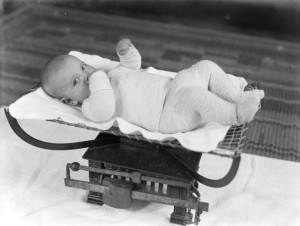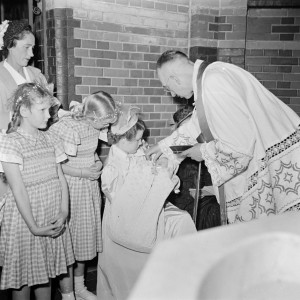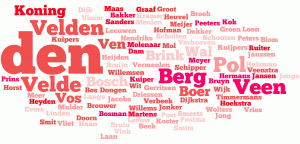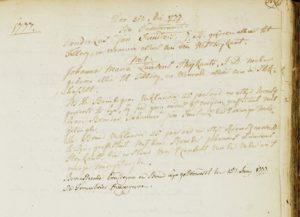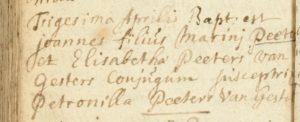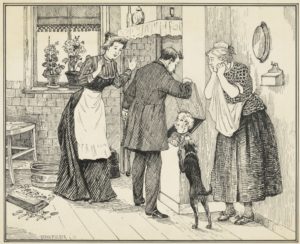As of 2024, there is a new law governing the last names of children born in the Netherlands. Parents already had the option to chose either the mother's or the father's name. Now they can also choose to give the children both names, either hyphenated or non-hyphenated. Example Let's say Peter Kamphuis and Lotte Ferwerda have a child together, a girl named Emma. They have the following options: Emma Kamphuis Emma Ferwerda Emma Kamphuis Ferwerda Emma Kamphuis-Ferwerda Emma … [Read more...]
Ask Yvette – How to record names with different spellings
I was tagged in a Facebook post asking how to deal with variations of surnames in your genealogy software. Genealogy software typically requires us to choose one name as the default to use in reports and lists, and allows us to enter alternative names. I use three different strategies to select which name to use as the main name, depending on when the person was born. I record other names and major spelling variations as alternative names. Born after the civil registration The civil … [Read more...]
Ask Yvette – Is my last name Dutch?
One of the questions I get asked frequently in person is whether a certain surname is Dutch. That can be tricky to answer, especially if a name got spelled differently after emigration. To find out where your name comes from requires genealogical research to trace the line that bears the last name back to its place of origin. That being said, here are a few resources to see if a last name occurs in the Netherlands: Database of surnames in the Netherlands. This is the first place to … [Read more...]
Quick tip – Are you Searching for the Right Name?
There can be different reasons why you can't find the person you're looking for. Perhaps they were from a different town, or the record you need doesn't survive. But they could be hiding under a different name. Before the introduction of the civil registration (1811 in most parts of the Netherlands), there was no requirement for a hereditary surname. People could be using different surnames in different records: They could use a patronymic, named after their father's first name. The … [Read more...]
Quick tip – “De” Names do not mean Huguenot
The prefix "de" in a name can be confusing. It means "the" in Dutch but can also mean "de" in French. People who have done Huguenot research often assume a "de"-name indicates a French or Huguenot origin. But when you're dealing with a Dutch family, think horses not zebras: your Dutch ancestor with a "de" name was probably Dutch. The most popular Dutch "De"-names are: De Vries [the Frisian] De Jong/Jonge [the younger] De Boer [the farmer] De Groot [the great/tall] De Wit … [Read more...]
Eight Dutch Naming Patterns to Watch Out For
Understanding how Dutch people named their children or themselves will help you solve your family mysteries. Here are eight Dutch naming patterns to watch out for. Naming children after grandparents Many Dutch children were named after their grandparents, often in a specific order: the first son after the paternal grandfather, second son after the maternal grandfather, first daughter after maternal grandmother, second daughter after paternal grandmother. After the grandparents were named, … [Read more...]
Quick tip – Search without the last name
If you can't find the person you're looking for, try searching without the last name. Before 1811, last names were not fixed in many parts of the country. People may appear in records using farm names (in the eastern part of the country) or patronymics (everywhere else), or even under a different last name. By searching for other characteristics, such as the first name of the person you're looking for and their father's first name, you may find people even if they're hiding under a different … [Read more...]
Quick tip – Patronymics May Not Be Easy to Recognize
Sometimes it's hard to see the difference between a patronymic and a middle name. One of my ancestors, Hendrik Jan Smulders was called "Jan" because his father was named Jan. At that time, people in Tilburg didn't use a genitive form to indicate patronymics so it's difficult to see if "Jan" is a middle name or a patronymic. In other regions and times, the name might have been Jans, Jansen, Janssen, Janse, or Jansse, which more clearly define it as a patronymic. Another situation where a … [Read more...]
Quick tip – Last Name or Patronymic?
If you're researching a family with a name like Jansen, Zwiers, or Pieterse, at one point you will find the original person for whom the name was not a hereditary last name but a patronymic derived from the father's name. My mother's name is Marijnissen. As a beginning genealogist, it took me a while to realize that the father of her brick wall ancestor wasn't called Marijnissen but had Marijnis as a first name. I found his father as Marinus Peeters. When dealing with such names before … [Read more...]
Quick tip – Hiding under another name
If your ancestors were from a small town and you can't find their parents, perhaps they're hiding under another name. There wasn't a great influx of new people in a small town, so don't automatically assume that people came from elsewhere if you can't find them. They could be hiding under a different farm name, or their last name could be a patronymic referring to the first name rather than the last name of the father. Or maybe they were the first in their family to use that particular name … [Read more...]
